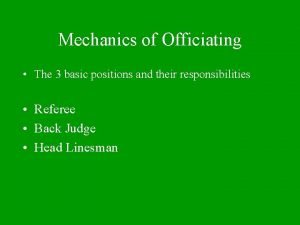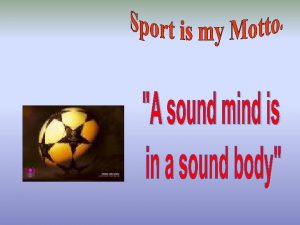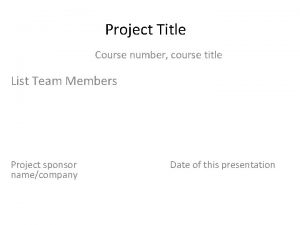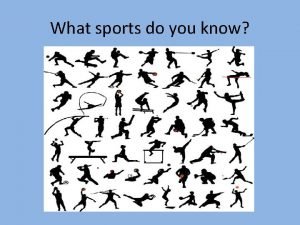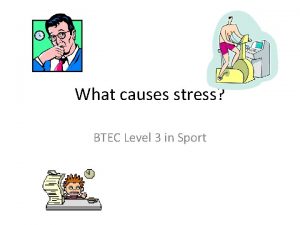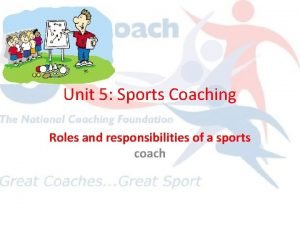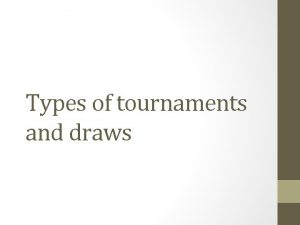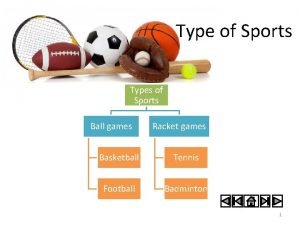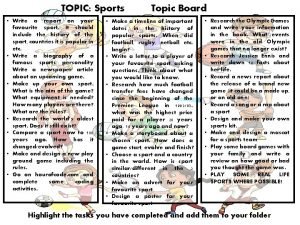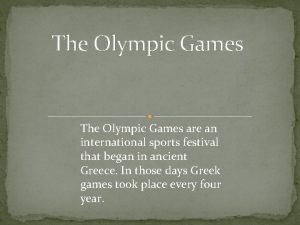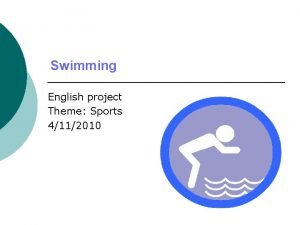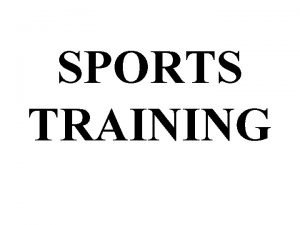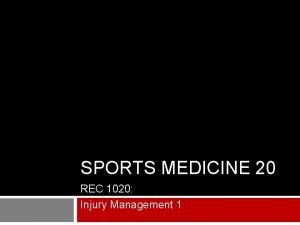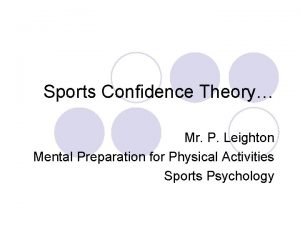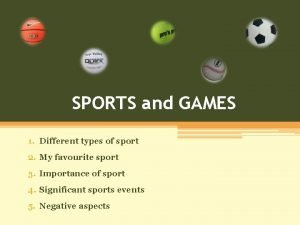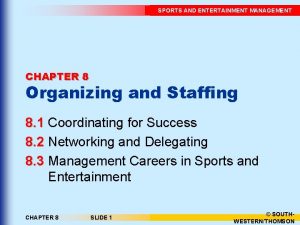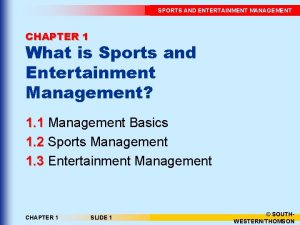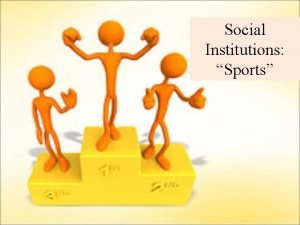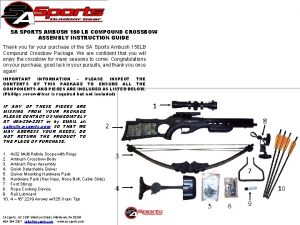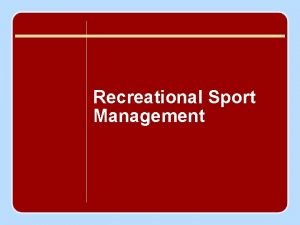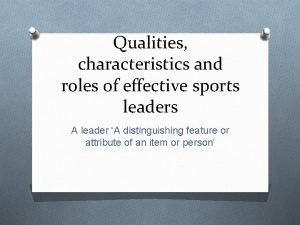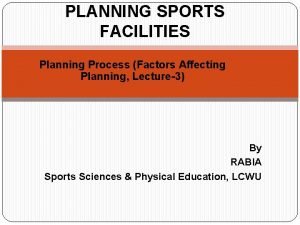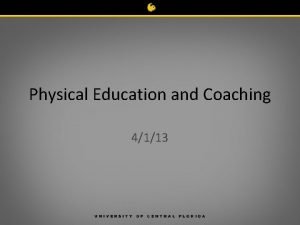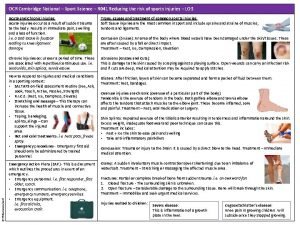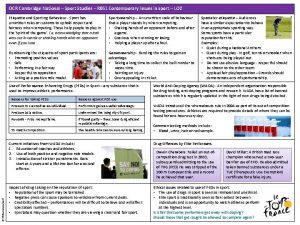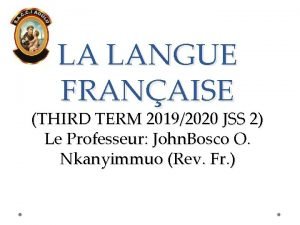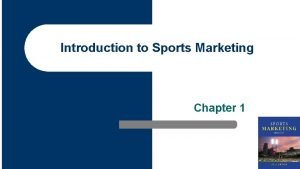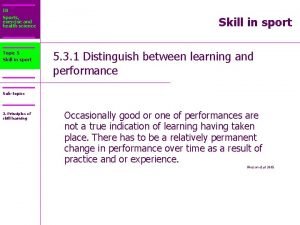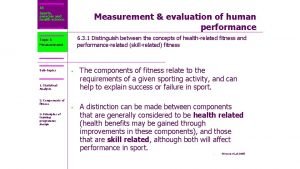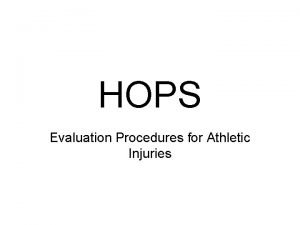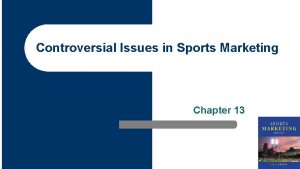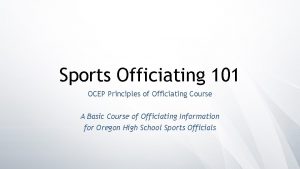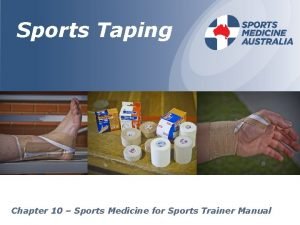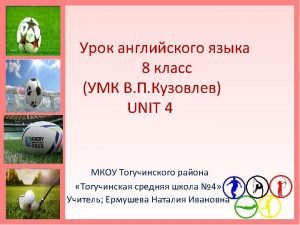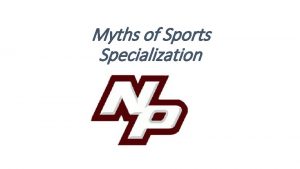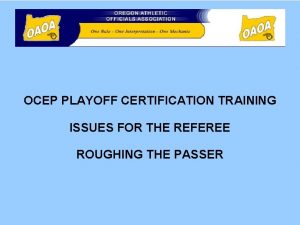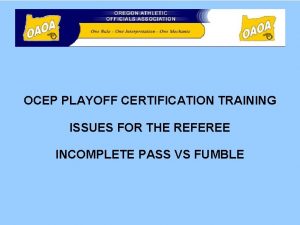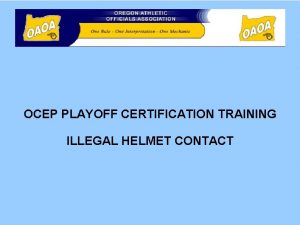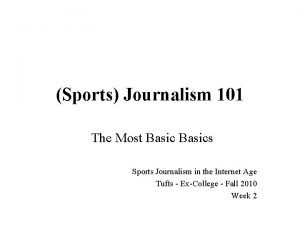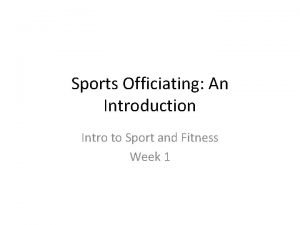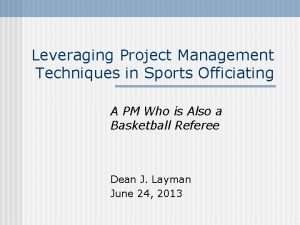Sports Officiating 101 OCEP Principles of Officiating Course

































































































- Slides: 97

Sports Officiating 101 OCEP Principles of Officiating Course A Basic Course of Officiating Information for Oregon High School Sports Officials

Topics • Introduction • Local Officials Association • Legal and Business Issues • Roles, Responsibilities, and Ethics • Goal Setting • Officiating Styles • Communication Skills • Building Confidence • Concentration and Anxiety • Making Decisions • Managing Conflict • Fitness for Officials • Looking Ahead

Introduction Welcome

Participant Introductions • Who are you? • How much officiating experience do you have? • Why did you want to become an official? • • Prolong Athletic Involvement Personal Reasons Provide an Enjoyable Physical Activity Extra Money – Part-time Career

Local Officials Association Lesson 1

OSAA Governing Structure 291 Member High Schools OSAA Delegate Assembly OSAA Executive Board

OSAA Executive Director & Staff OADA OACA OAOA Local Officials Association

Your Local Officials Association • Join a local officials association: www. osaa. org/officials • Governed by your association’s Executive Board as described in your association’s constitution and by-laws • Commissioner of Officials assigns games • Don’t lobby or beg for games – do not trade assignments • Do not solicit games from coaches or Athletic Directors (ADs) • Attend regular meetings

Your Local Officials Association • Most associations are incorporated as non-profit corporations for educational purposes • OAOA dues provide director’s and officer’s insurance coverage • Associations may charge membership dues or fees: • Some association collect dues at the start of the season • Others may automatically deduct dues and fees from payments

Utilizing Your Association • Communicate – especially with your Commissioner • Find a mentor or develop a support network • Car-pool to assignments with crew • Hang around officials, watch games, arrive early, stay later • Post-game get-togethers • Training opportunities: camps, clinics, films, publications • Ask for observations; get feedback • Connect with national associations, NASO, frequent officiating websites

Questions to Ask • What is the process for advancement in your local officials association? • If you feel that you’re being treated unfairly, how do you voice your concerns and to whom?

Legal and Business Items Lesson 2

OSAA Certification Requirements • To be an OSAA certified official, an individual must: • • Be at least 18 years of age Be a member in good standing of a local officials association Complete the annual OSAA online officials registration process Take the NFHS rules exam Attend six study/training meetings or complete 10 hours of training Pass an annual criminal history conviction screening Complete an annual OSAA concussion awareness training course • The full list of certification requirements can be found in the OSAA Athletic Officials Handbook, Rule 4

Criminal Conviction History Screening • Per OSAA rule to be certified, officials cannot have been convicted of: • A felony involving the use, possession or sale of a controlled substance within the last 10 years*; or • A crime involving the use or threatened use of violence against a person within the last 10 years*; or • A crime involving a minor child at any time. *The 10 -year period of ineligibility to officiate shall commence from the date of suspension from officiating duties or from the date of conviction – whichever occurred first

Concussion Training Requirement • In the state of Oregon, the law requires youth sports officials to receive annual training on concussions • The OSAA requires an online course to be completed (which meets this requirement) before an official is allowed to be assigned to any contest • The OSAA online course, “Understanding Concussions – What Officials Need to Know”, is oriented towards officials and is the only acceptable training recognized for OSAA officials • Concussion training must be completed every year

OCEP Principles • The OSAA/OAOA Officials Certification and Education Program, or OCEP, is designed to ensure that Oregon officials statewide are trained in a consistent and standardized manner • There are two components: OCEP Principles certification and sport specific OCEP Playoff certification • Officials must obtain OCEP Principles certification within the first three years of officiating • This course presentation fulfills this requirement • Officials certified by the OSAA in 2005 -06, or prior; or any transfer official from another state are exempt

OCEP Playoff • As part of OCEP, officials selected to officiate any OSAA State Championship event must have obtained and be currently certified in their sport specific OCEP Playoff certification • To obtain, officials shall attend an OCEP Playoff Certification Clinic, soccer officials obtain OCEP Playoff certification by completing the USSF Grade 8 Referee Course • To maintain, and have current OCEP Playoff certification: • Football, Volleyball, Basketball, Baseball, and Softball officials must recertify every five years in the same manner as obtaining OCEP Playoff certification • Wrestling officials must recertify every three years in the same manner as obtaining OCEP Playoff Certification • Soccer officials must recertify every five years by attending one of the following: ORC Referee Committee Regional Referee/Intermediate Training Clinic, ORC Big Training Weekend, or an SRI approved training session

Levels of Certification Level Registered OSAA Registration Background Check Concussion Training Exam OCEP Principles OCEP Playoff Cannot officiate any OSAA sanctioned contest Sub-Varsity < 75% Can officiate OSAA sanctioned contests below the varsity level Varsity ≥ 75% Can officiate varsity and sub-varsity OSAA sanctioned contests Playoff ≥ 90% Can officiate any level of OSAA sanctioned contest and OSAA State Championship events

Independent Contractors • OSAA officials are Independent Contractors, not employees • No withholding of state or federal taxes from earnings • Independent contractors receive a Form 1099 at the end of the year • Solely responsible for reporting and paying taxes, including state and federal income taxes, self-employment taxes, etc. • Some officiating expenses can be deducted • Consult a tax professional • Not subject to wage/hour laws (min. wage, overtime, rest periods) • Not covered by worker’s compensation insurance • Cannot use the wages they earn to qualify for unemployment insurance benefits when they are unemployed • No employment benefits, such as health insurance and pension plans

Important Liability Concerns • Incidents with player injuries • Allow medical personnel to attend to the player • Game played according to the rules • Manage the game, control rough play, penalize unsporting conduct • Player equipment • What is allowed and what isn’t; do not compromise participant safety • Playing surface inspection • Safety is the number one priority

Official’s Legal Concerns • Officials need to have good medical and personal liability insurance, or as required by state law • Secondary coverage is available through the NFHS • Additionally through the National Association of Sports Officials (NASO)

Other Administrative Items • The OSAA and the NFHS do not recognize protests • In the justice courts, game calls cannot be challenged or outcomes changed without demonstrable corruption (bribery) • Disagreement over calls is part of the game, it’s part of our human nature • Officials should support one another, even if opinions differ • Judgement calls can be readily defended by governing bodies and commissioners • However, the misapplication of rules is inexcusable

Physical Contact with Officials • Under Oregon law, it’s a criminal offense to assault a sports official • However rare, be prepared with recommended procedures: • • Don’t physically strike back – get to somewhere safe Identify the attacker, if possible – even if just a description Obtain names and contact information of witnesses Write down what happened and how you were injured Get appropriate medical attention, if necessary Determine if video of the game/incident is available Contact your Commissioner immediately Consult legal counsel

Roles, Responsibilities, & Ethics Lesson 3

Roles • What are the roles of the official? Keep the Game Safe, Fair, and Fun

Responsibilities • Ensuring Player Safety • Coach must assert players are legally and properly equipped • Officials must inspect and enforce proper player equipment for rule compliance and for safety of all participants • Inspecting Facilities • Plan to set aside time for field/court/facility safety • Identify and correct safety hazards utilizing game-site administrators • The earlier recognized, the better

Responsibilities • Regulating Game Conduct • It is up to the official to know the rules of the game • Enforcement of infractions/violations falls to the official • Officials must learn when to use warnings, when to penalize, when to ignore, and when to be firm • Player safety and unsportsmanlike behavior are important aspects that need to be addressed – what you allow, you promote • Injury Response • When in doubt, act on the side of caution in regards to player safety

Responsibilities • Response to Crowd Situations • If necessary, alert game management • Do not engage with spectators directly • Encouragement of Fair Play • Fundamental role of an official is to see the contest is played in a safe, fair, and fun manner • Know the allowable considerations for rule enforcement • Avoiding outside influences and ignoring irrelevant factors will help officials operate consistently throughout the entire contest

Responsibilities • Promotion of Good Sportsmanship • Officials can influence player behavior through game management and rule enforcement • There are many tools at the disposal of officials • Acknowledge acts of good sportsmanship • Penalize unsporting conduct

Ethics • Master Knowledge of Rules and Mechanics • Officials shall master both the rules of the game and the mechanics necessary to enforce the rules and should exercise authority in an impartial, firm and controlled manner • Officials need to know what they are doing when they step onto the field, court, or floor • We need to know the rules and where to stand to make the best calls • Officials must be decisive, and not inconsistent, and always in control of their emotions

Ethics • Work Constructively and Cooperatively • Officials shall work with each other and their state associations in a constructive and cooperative manner • Officials need to get along with and respect the people in their local association, their officiating partners, and the folks at the state office • Everybody needs to work together to make things better • There is no justification to “bad mouth” anybody • Getting along makes your officiating experience more rewarding and enjoyable

Ethics • Uphold Honor and Dignity of the Profession • Officiating is no longer a casual hobby, treat is as a profession • Officials have a vast amount of “final” power and need to behave in a professional manner at all times • Be a responsible and professional steward of the game • Prepare Mentally and Physically • Dress neatly and carry yourselves in a manner consistent with the high standards of the profession • Officiating is a physical activity, be in good shape • Focus on the job at hand leave other problems behind for a few hours • Look good; the uniform and how it’s worn says a lot about your commitment

Ethics • Respect and Fulfill Contractual Obligations • • Communicate your availability and be mindful of your commitments Professionalism includes being accountable to your obligations It’s a cardinal sin to be late to a game; plan ahead Leave plenty of time for heavy traffic, travel, weather, etc. If you accept a game assignment, be there Contact your assigner or one of your partners if problems arise Don’t turn back one assignment for a better offer; this is unethical behavior that will not be tolerated

Ethics • Your Conduct Influences Respect of Others • Remember you only get one chance at a first impression • Your actions may be perceived as representative of your officials association or toward the profession itself • Do not do anything that diminishes the respect people have for officials - don’t say or do anything unwise or compromising • Do not draw attention to yourself, be professional, the game is not about you, it’s about the players • Sometimes that’s hard for an official to accept, because it’s human nature to want to be recognized for the job you do

Conflict of Interest • Sports officials must be alert to potential conflicts of interest • In the perfect world, officials would be strangers to coaches and schools, but in the real world, that’s not going to happen • It’s the perception of bias and favoritism that makes things difficult when officials do not recognize potential conflicts of interest • Officials are ethically bound to report any conflict of interest, no matter how remote, to their assignor • Assignors appreciate knowing this in advance prior to making a schedule, but should a conflict of interest develop as the season progresses, officials must request a change in assignment

Minimum Conflict of Interest Policies • Unless the ADs and the assigning Commissioner agree, no official shall be assigned to a varsity contest if: • The contest involves a school currently attended by the official’s child or step-child • The contest involves a school at which the official or a member of his/her immediate family is a current employee or coach • An immediate family member of the official is a team member of one of the involved teams • The contest involves a school from which the official has graduated within the last four years • There are other factors or relationships between the official and a participating school that, in the judgment of the commissioner or the official, might give rise to the appearance of a conflict of interest

Immediate Family

Goal Setting Lesson 4

Set Goals • In order to be successful at anything, you must have some goals • Setting goals helps to motivate and improve performance; if you set an important goal for yourself, you will generally work hard to achieve that goal • Without goals, many people just drift through life, some bump into success along the way, others don’t • Goals help focus on what is important • Setting goals is setting standards for what you’d like to do

Potential Problems with Setting Goals • Not measurable • Conflict with other goals • No ownership • Setting too many goals • Obstructed by fear of trying something new or fear of failure • Setting goals to please someone else; lacking investment • Unrealistic expectations

Goal Setting Suggestions • Consider your needs as the highest priority • Identify what you want to get out of officiating • • What are your strengths? Do you want to further improve? What are your weaknesses? What do you want to change? What do you enjoy the most out of officiating? How can you advance? Are there previous evaluations or feedback to reflect on?

Setting Successful Goals • Establish short term and long team goals • Make goals specific • State goals in positive terms • Set goals that are obtainable • Set goals that are measurable • Have a feedback mechanism in place • Know what is necessary to achieve your goal • Be flexible and change or adapt as necessary, learn from speedbumps • Enjoy meeting your goals

My Goals • Take a minute or two and identify one goal you can accomplish this season.

Officiating Styles Lesson 5

By the Book Approach – I Am the Law • Master of the rules, inside and out • Events are very black and white with prescribed reactions • Pros? • Cons?

Little Involvement – Less is More • Let players play with as little interference as possible • Avoid conflict, let game flow • Pros? • Cons?

The Middle Ground • Use common sense • Implement preventive officiating and know what that means • Be well versed in the rules of the game, but also know the spirit of the game and the correct intent of the rules • Know what to call and when to call it • Know when the best call may be a “no-call”

Context of a Contest • The context of a game may determine which officiating style works best • Big cross town rivalry • Bad blood between opponents • Skill level of the players • Some of these may be known before the game starts • Be mindful of your preconceptions coming into a contest, do not let your personal preferences or notions impose itself on a contest unduly

Good Officials • Know the rules and spirit of the game • Know and use correct vocabulary • Know mechanics for positioning and signaling • Communicate effectively • Make calls with confidence • Are able to focus on the game • Remain invisible – don’t draw attention • Keep in control – stay poised • Stay in shape and hustle

Traits of Top Officials Average Officials Top Officials • Reactive • Foul Management • Calls Fouls • Sees Advantage • Avoids Pressure • Penalizes • Proactive • Game Management • Sorts Fouls • Feels / Anticipate • Handles Pressure • Communicates

Here’s What It Takes • Be a good partner • Have passion • Be consistent • Develop a rapport with participants; be approachable • Be decisive; firm and fair; unflappable • Maintain integrity • Use good judgment • Enjoy what you are doing

Admirable Characteristics • Think of a past role model, could be an officiating colleague, a teacher, a mentor, a friend • What is one single aspect that makes him or her stand out? • What character trait did you think was their strength? • How can you integrate that characteristic into your officiating style? • Reflect on your strengths.

Communication Skills Lesson 6

Referee Tools • What tools are at your disposal as an official when it comes to managing a contest?

Referee Toolbox Terminate Body Language “The Look” Warn Hand Gestures Caution Whistle Smile Voice Admonish Suspend Ejection

Effective Communication • Two important steps: • Sending the right message • Being a good listener • When speaking, be clear and concise; go slowly • Choose your words and if you can’t think of something to say, don’t say anything at all • Silence is often misinterpreted, but never misquoted • There are many ways officials communicate

Body Language • Physical appearance • Posture and body position • Signal mechanics • Hand gestures • Facial expressions and eye contact • Personal space • Tone, pitch, and inflection

Communicating with Partners • Must function effectively as a team • Make an effort to get along with others • Take responsibility for your own actions • Don’t blame others for your mistakes • Encourage each other – be honest • Share strengths and experiences • Ask for help or advice – give when asked • Assist, do not insist

Keys to Success • Have a good pre-game conference • Have a good post-game conference • Ask for feedback from partners, game observers, evaluators • Examine your own performance; self-evaluation • What did I do well? • What can I do better? • Be aware of some potential barriers • Crew members of the opposite gender • Variance of officiating experience • Language barriers

Building Confidence Lesson 7

What Is Confidence? • Confidence is the belief that you can successfully do what you want to do • The feeling or belief that one can rely on someone; firm trust • A feeling of self-assurance arising from one’s appreciation of one’s own abilities or qualities

Importance of Confidence • Confidence is a skill that can be learned • You have to think that you are able to successfully do what you want to do • You have to believe that you will make the correct call • You have to get rid of negative thoughts • Talk to yourself in a positive manner • Don’t let your confidence be shaken by criticism dished out by coaches, players, spectators, or even yourself • That’s a tough one!!! If it were easy, everyone would officiate

Building Confidence • Practice your skills and techniques • Work lower level games • Attend camps and clinics • Get as much experience as you can • Observe and ask questions of others • During the contest, get the easy stuff right

Overconfidence • Officials who are overconfident think they are better than they really are • These officials believe that they do not have to prepare as much or put forth the same effort as others to get the job done • Quite often they can skate by without causing problems, especially if their partner is a take-charge official, or if they are absorbed and insulated by their fellow crew members • Unfortunately, this often causes the other officials to overofficiate to compensate for the weaker crewmate

Concentration and Anxiety Lesson 8

Improving Concentration • As an official, you must be able to: • • Cope with pressure and anxiety Focus on action that is relevant and tune out external factors Refocus when distracted Maintain a positive attitude

Breaking Concentration • What are some factors that can break an official’s concentration? • Unable to forget past calls – especially the bad calls • Worrying about future plays • Thinking about too many things • Work or family concerns that linger and creep into mind • Worrying about image or perception of coaches or fans

Anxiety • Because officiating is emotional and stressful, in order to become a successful official, you must learn to recognize and deal with anxiety • Stresses can be positive or negative • Successful officials are able to remain calm and in control despite adverse circumstances, even in the face of physical and emotional stress • Good officials take control and make the proper calls under pressure

Sources of Stress or Anxiety • Fear of failure • Fear of inadequacy • Perceived loss of control • Outcries from coaches or spectators • Others?

Negative Impacts of Anxiety • Physical • Heart rate and breathing rate • Tightness • Fatigue • Psychological • Reduced concentration • Impaired decision making • Emotional • It’s hard to disassociate from hurtful comments; taking it personally • Attitude is affected which changes mindsets and decisions

Stress Management Strategies • Deep breathing • Counting • Positive self-talk • Smile • Good preparation – self confidence • Stay focused on action at hand • Find appreciate natural pauses in the game • Slow down…. then slow down some more

Making Decisions Lesson 9

Decisions • How do you make decisions? • Flip a coin? • Randomly pick an option? • FIND your way? • Comparative experience?

Instinct & Comparative Experience • Good officials don’t spend a lot of time thinking about the calls they make • They react to what they observe and because of their experience; know what to look for, and then, what to call • As we know, not every foul or rule infraction needs to be called • Remember, we talked about overly technical officials who call everything by the book, and then those officials who just don’t want to step up and get involved • The successful official is somewhere in the middle

Essential Elements for Making Decisions • Know the rules • • Terms and definitions Player’s rights and restrictions Violations and penalties Peripheral regulations • Study the rule book 9 Ways to Study the Rule Book 1. Speed-read the entire book 2. Categorize the rules 3. Break down each chapter 4. Have several copies of the rule book 5. Read in short increments of time 6. Review each day 7. Study just before falling asleep 8. Check related case book plays 9. Talk with rules experts

Essential Elements for Making Decisions • Know the sport’s language and proper terminology • Formal rule book • Informal “street language” • Know the informal terms so you can understand player’s and coach’s meanings • Use the formal terms • This is part of officiating consistency and is another reason why rules knowledge is important

Essential Elements for Making Decisions • Master the mechanics of communicating decisions • Use clear and proper signals • Only use approved mechanics • Be polite when speaking • Use good voice and mannerisms • Adapt to the nature of the game • Know the context of the contest • Be in the proper position • If properly positioned, the less likely your judgment will be questioned • Read anticipate what the teams are trying to do

Essential Elements for Making Decisions • Focus • Don’t let down in dead spots • Stay focused during periods of inactivity like time-outs, between periods, or between plays • Use the down time to regroup and refocus if necessary • Remain calm • Slow down • Process what you have observed before making your call • Use positive self talk

Essential Elements for Making Decisions • Work with fellow officials • Learn when to get and give help • Get together and conference if necessary • You are not alone out there

Managing Conflict Lesson 10

Controversy Is Inevitable • People are emotionally involved • Rules exist to limit behavioral options • Officials enforce the rules • Society insists on placing blame rather than accepting responsibility

Terminology • Controversy: different viewpoints or opinions • Conflict: confrontational behavior (words or actions) that develops out of controversial situations

How To Manage Conflicts Step 1: Be Perfect Step 2: Don’t be Imperfect

Mitigating and Minimizing Conflict • Internal issues - psychological makeup • Know your pressure points • Be confident about preparation • Do not take controversy personally • Maintain self-control • Do not add fuel to the fire • Accept that coaches will get the last word • Have credibility

Mitigating and Minimizing Conflict • A professional appearance can minimize conflict • Showing up looking sharp vs. looking sloppy; how do you think the players, coaches, and fans will react? • The way problems are handled often determines if controversy becomes conflict • Do not make a mountain out of a mole hill • Deal with smoke early before it becomes a forest fire • Officials may have to use both passive and assertive modes of game management

Conflict Resolution • The official is the ultimate authority regarding the contest • Think through your options • What we see, hear, sense and feel trigger certain emotional responses • Recognize preconceptions of others • Do not say anything you’ll regret later • Be careful when using humor • Positive wording, “I hear you and I saw this” or “Nevertheless” • It’s hard to argue with someone who is polite

Conflict Resolution Solutions • Be able to read the situation • Know the difference between a momentary emotional outburst and unsporting conduct or gamesmanship • Know your surroundings; are you putting yourself in the way? • Appear to be receptive • Listen and acknowledge • Extend the courtesy to listen; empathize • Don’t invite confrontation • Be mindful of your body language • Respect personal space • Keep all communication professional

Conflict Resolution Solutions • It is okay at admit a mistake • This can be an effective defusing option • Do not overuse this option • Errors are not excused for inappropriate actions/language or irresponsible behavior • If a coach tries to “get in your face, ” turn sideways so you are shoulder-to-shoulder, move away if possible • harder to speak in an aggressive, confrontational way when both parties are side by side • Lower your voice and speak slower

Conflict Resolution Solutions • Let the coach vent • Permit the coach to disengage; it’s now over • Persistent venting is unsporting • Recognize when it is time to cease talking • Do not insist on having the last word • Project serenity amidst a storm of controversy • Be determined not to escalate the problem • Impose penalties professionally when efforts to minimize or resolve conflict don’t work • Walk away to report the penalty • Don’t bait anyone into a second penalty

Fitness for Officials Lesson 11

Components of Physical Fitness • Aerobic endurance • Strength • Flexibility • Speed • Coordination • Position = Mobility + Anticipation • Both aspects are required

Additional Fitness Concerns • Diet and nutrition • Rest and sleep • Pre-game warm-up • Stretching after the contest • Glasses • Shoes • Injuries

Fitness Program • What is your current fitness program? • Is there room for your program to be improved to be more useful?

Looking Ahead Lesson 12

After Every Game • Do a self-evaluation • Learn from your successes and your mistakes • Pick up positive examples from your partners; figure out where you can integrate them into your next game

Improvement During the Off-Season • Maintain good physical conditioning • Continue studying rules and mechanics • Attend camps and clinics • Work pre-season scrimmages, summer leagues, and off-season practice games • Participate in pre-season study groups • Re-examine your goals and expectations

Thank You “Without officials, it’s just recess. ”
 What are the mechanics of officiating
What are the mechanics of officiating Referee signals basketball
Referee signals basketball 3 person mechanics basketball
3 person mechanics basketball Dead ball officiating in football
Dead ball officiating in football Triple jump steps
Triple jump steps Outdoor sports name
Outdoor sports name One and a half brick wall
One and a half brick wall Course number and title
Course number and title Course interne course externe
Course interne course externe Sports marketing principles
Sports marketing principles Seo for youth sports clubs
Seo for youth sports clubs It is a sport in which participants compete as individuals
It is a sport in which participants compete as individuals Causes of stress in sports
Causes of stress in sports Centreville high school
Centreville high school Roles of coach
Roles of coach Ethnocentrism examples
Ethnocentrism examples Ladder competition
Ladder competition Type of football game
Type of football game With her boyfriend yesterday she doesn't
With her boyfriend yesterday she doesn't Traditional sports in china
Traditional sports in china Topic about sports
Topic about sports Sports rough draft
Sports rough draft The olympic games are an international sports festival
The olympic games are an international sports festival How do sociologists define sport?
How do sociologists define sport? Sports marketing environment matrix
Sports marketing environment matrix Advantages and disadvantages of gymnastics
Advantages and disadvantages of gymnastics 4112010 color
4112010 color Oakton high school
Oakton high school Meaning
Meaning There are many different kinds of sports
There are many different kinds of sports Sports include all forms of competitive activity or games
Sports include all forms of competitive activity or games Motivation psychology definition
Motivation psychology definition Sports show examples
Sports show examples Sports medicine definition
Sports medicine definition The members of the event triangle are
The members of the event triangle are The british are a sports-loving nation
The british are a sports-loving nation Vealey's model of sports confidence
Vealey's model of sports confidence What are the different types of sports?
What are the different types of sports? Sports and entertainment marketing lesson plans
Sports and entertainment marketing lesson plans Accel entertainment jobs
Accel entertainment jobs Sports entertainment management
Sports entertainment management Cudgeling sport
Cudgeling sport Advertisement introduction
Advertisement introduction Oaa activities
Oaa activities How to make sports writing
How to make sports writing Largest sports organization in the world
Largest sports organization in the world Sport as a social institution
Sport as a social institution Sports equipment software
Sports equipment software School sports program sample
School sports program sample Sa fever crossbow
Sa fever crossbow Sa sports ambush crossbow reviews
Sa sports ambush crossbow reviews Rop sports medicine
Rop sports medicine Live sports broadcast solutions
Live sports broadcast solutions Red bull extreme sports
Red bull extreme sports Leisure sport management model
Leisure sport management model Characteristics of a sports leader
Characteristics of a sports leader Catastrophe theory
Catastrophe theory Sports proposal for school
Sports proposal for school Chapter 7 sports and entertainment marketing
Chapter 7 sports and entertainment marketing Westfield sports injuries
Westfield sports injuries Extreme sports presentation
Extreme sports presentation Factors that affect the planning process
Factors that affect the planning process Oxyshot
Oxyshot Sport pedagogy definition
Sport pedagogy definition Factors affecting performance in sports
Factors affecting performance in sports Ocr sports science
Ocr sports science Parabolas in sports
Parabolas in sports Ocr sports studies
Ocr sports studies Optimum sports performance
Optimum sports performance Nexxt level baseball
Nexxt level baseball Sports writing
Sports writing N the zone sports photography
N the zone sports photography Sports scoring software
Sports scoring software Licensing sports marketing
Licensing sports marketing 509 sports
509 sports Let's talk about sport
Let's talk about sport Expliquer l'impression du sport
Expliquer l'impression du sport Introduction to sports nutrition
Introduction to sports nutrition Spectator sports pyramid
Spectator sports pyramid Proverbs about sport
Proverbs about sport Ib sports exercise and health science syllabus
Ib sports exercise and health science syllabus Ib sports, exercise and health science topics
Ib sports, exercise and health science topics Ib sports exercise and health science
Ib sports exercise and health science How sports affect mental health
How sports affect mental health Emily edison nutrition
Emily edison nutrition Hops sports med
Hops sports med Hops athletic training
Hops athletic training Maestralidia.com
Maestralidia.com Kvs national sports meet 2017-18
Kvs national sports meet 2017-18 Afrim sports
Afrim sports Auxiliary marketing activities
Auxiliary marketing activities Front range action sports word
Front range action sports word Extreme sports bungee jumping
Extreme sports bungee jumping Gameball elizabethan era
Gameball elizabethan era Sports that start with o
Sports that start with o Different kinds of sports
Different kinds of sports Controversial issues in sport
Controversial issues in sport Jayanshu chaturvedi
Jayanshu chaturvedi
